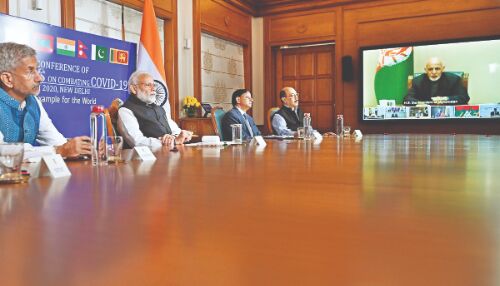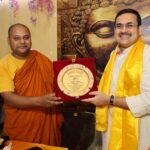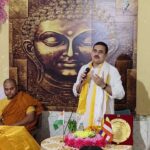The crisis of our times
- By : Anirban Ganguly
- Category : Articles

PM Modi’s prompt response to the COVID-19 pandemic is emblematic of the required mindset and thrust of actions that are necessary in such trying times
Prime Minister Modi has become the first world leader to speak of international and regional joint action in tackling the COVID-19 challenge. His convening the SAARC leaders to exchange ideas and forge a united front to tackle this virus is not only a regional effort but symbolises a civilisational outreach and effort at a time of a crisis of civilisation. Modi’s injunction to “Prepare but don’t panic”, has instilled a sense of purpose and people, by and large, seem to be responding. To the traditional and civilisational Indian, stoicism has now brought forth the mantra to do more, to remain ahead of the “curve” and to eventually beat it.
Modi was clear that the problem was not being underestimated but that “knee-jerk reactions” were also being avoided. India had prepared for such an eventuality and initiated steps to contain the spread of the virus from mid-January through a “graded response mechanism”. This was followed by imposing gradual travel restrictions and, as Prime Modi told the SAARC leaders, by developing protocols, “for each stage of managing this pandemic; for screening at entry points; contact tracing of suspected cases; quarantine and management of isolation facilities and for the discharge of cleared cases.” Within the last two months, from having one major testing laboratory for such outbreaks, India has already developed sixty facilities. There is also an increasing public awareness effort and India as a whole seems to be coming alive to the various dimensions of this challenge.
n his first term, Modi had spoken of his vision of developing SAACR into a shared zone of prosperity, it was that commitment of his which led him to renew the call to unite against a threat which is common to the region. Some observers, who have at times doubled up as journalists and wannabe historians, were quick to point out how Modi was suddenly reviving SAARC now, having ignored it in the past! These elements forget that by this one move, Modi seeks to inject a fresh vision and relevance into SAARC, to make the forum responsive and to reinvent it and to make it focused on certain key areas that are of crucial concern to the region. He has given SAARC a mission which is in accordance to its framework and capacity. Even a renegade and rogue state therefore has some contribution to make in this reinvented framework of SAARC. In his concluding observations, PM Modi exhorted everyone thus, “We have to fight this battle together and we have to win it together. Our neighbourhood collaboration should be a model for the world”, he said. This approach has propelled SAARC into the next trajectory, this in itself has given the body a new meaning and lease.
In his first address to the newly elected BJP MPs at the beginning of his second term, Modi had reminded them of the need to work for people, in the spirit of Swami Vivekananda’s immortal exhortation, Shiva Jnane Jiva Seva (Serve humanity recognising them as portion or emanation of the Divine). It is this same approach which seems to drive him to take the initiative of convening leaders of the region to come together for a united action against this health and environmental challenge which has begun affecting every corner of the globe and is posing a severe challenge to humanity in terms of its economic, health and connectivity dimensions. His call for undertaking a similar exercise with G20 group has elicited a positive response.
Modi’s approach to such challenges has been far-sighted. His emphasis on Yoga, on its life-style transformative capacities, on making it popular across the world, his effort at embedding it in the collective global consciousness was a far-seeing move. Adopt to ‘Bharatiya’ ways in dealing with life and nature and thus place the first safeguards and defence against imbalance and disease, he has this emphasised on a number of occasions. His emphasis on creating and empowering AYUSH generated increased worldwide interest and attention on the traditional medicines and healing processes of Bharat. Next came his emphasis on the “Fit India Movement”, on the need to naturally remain healthy. Each of these he undertook on the scale of a mass movement or mobilisation. Peoples’ participation and active and robust involvement has always been the key to the success of his initiatives and outreach.
In India’s fight against COVID-19 too, Modi has reached out to the people. He has asked people to connect to share their solutions and ideas on the widely visited MyGovIndia site. This is another example of his approach towards channelising the positive energies of Jan Shakti – the power of the people. For conscious and active citizens, for people who want to make a positive change and contribution especially in times of challenge and crisis, for citizens who do not merely want to remain as complaining by-standers, for citizens who have no confusion on what they wish India to be, on how they want her to evolve in the comity of nations, this is an outlet. “Harnessing innovation for a healthier planet”, Modi observed, “a lot of people have been sharing technology-driven solutions for COVID-19” urging them to share these and thus help many.
Apart from providing interesting insights into how the collective consciousness was evolving towards tackling this challenge, such participation would, Modi observed, boost “the morale of all those doctors, nurses, municipal workers, airport staff and all other remarkable people at the forefront of fighting COVID-19…” It is this habit of his to invite and encourage technology and lifestyle-driven solutions from the people, to crowd-source ideas, to involve citizens, to invite them to be part of any effort that aims at altering mindsets, at addressing social challenges, at countering and effectively handling challenges that emerge before our collective existence, which has made Modi stand out. He has done this repeatedly and continues to dynamically adhere to this approach in his second term as well. Converging Jan Shakti, the aspiration to make a difference in society, to a Jan Andolan in order to address these challenges has been the Modi way. It makes any alteration and transformation long-lasting, impactful at the grassroots and compels us to think, ruminate by nudging us out of our comfort zones.
Some of Modi’s principal opponents have made fun of him in the past, they have parodied his exercise regime, they have laughed at his one-pointedness while tackling societal challenges. Now, during the COVID-19 crisis too, they are seen to be running around like the proverbial headless-chicken talking of tsunamis, people who went looking for fishes, returning waves, armageddon, apocalypse and whatnot, while Modi has chosen to creatively, affirmatively, resolutely, unflappably, with the people by his side, address a crisis of civilisation of our times.

















